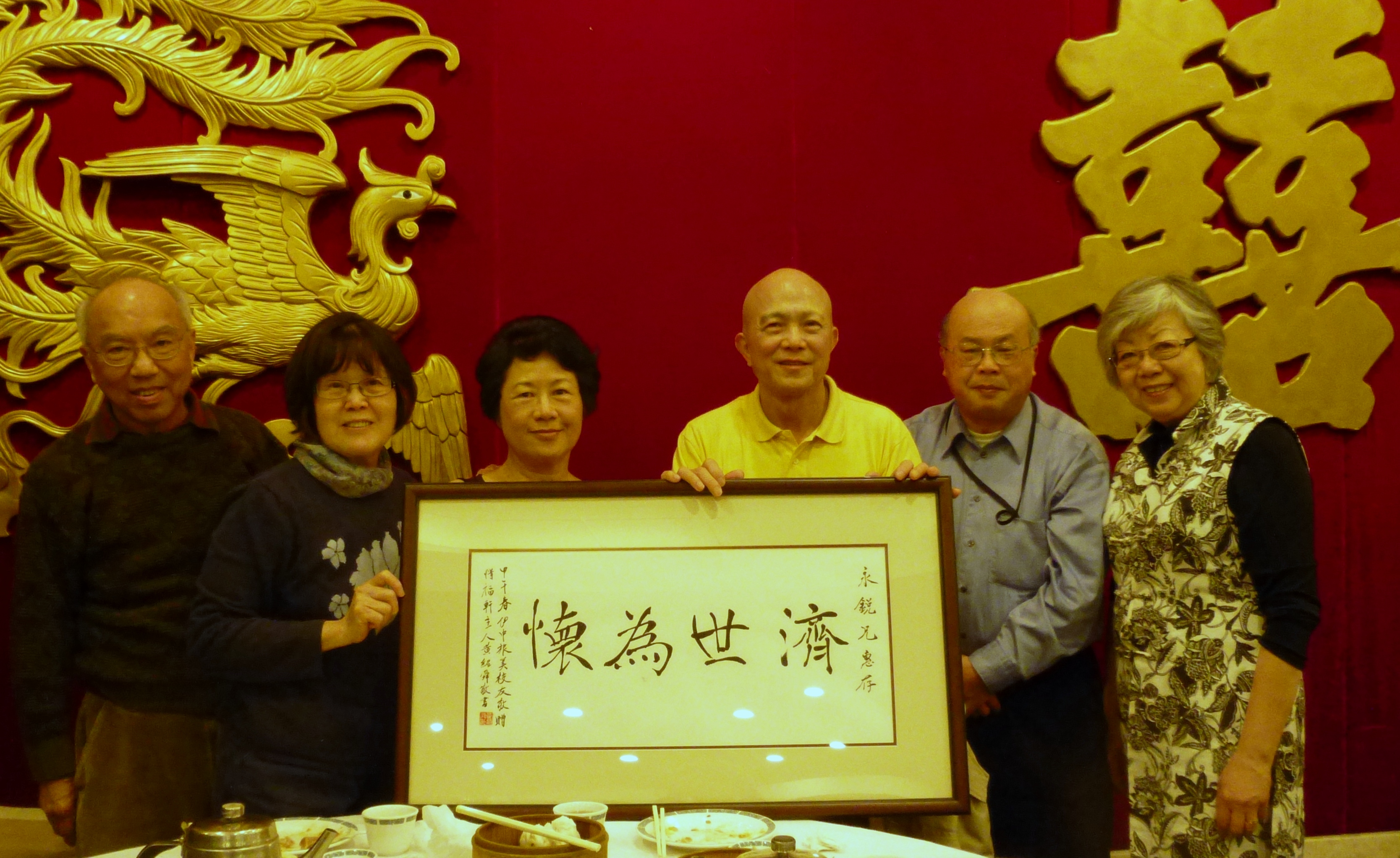Queen Elizabeth School
 Alumni Association (USA)
Alumni Association (USA)
伊利沙伯中學美國舊生會
 Alumni Association (USA)
Alumni Association (USA)
伊利沙伯中學美國舊生會

By Louisa Leung
President, QESAAUSA
Many of us if not all in our golden years tend to set our sight to enjoy the leisure time with family and friends, but not Paul. Three years ago, he actually decided to go back to school. He enrolled to study Chinese medicine at the University of East-West Medicine. He is going to fulfill his dreams of becoming a Chinese medicine practitioner. And so after 3 years of intensive study both in the United States and China, he is now a fully licensed Acupuncturist.
Over the years, we witnessed how hard he worked and how much effort he put into helping others. Some of our classmates including me were also benefited by his clinical practice in the treatment of our various illnesses. The purpose of the article by Paul that follows is to show the “WE CAN’ spirit if we set our goal to do it. Isn’t this also the QES spirit?
Tracing his family tree, several generations ago, Paul’s great great grandfather was an herbalist in Canton. Paul’s father practiced Chinese medicine in Hong Kong. That could have some influence in Paul’s decision of becoming a Chinese herbalist. We are certain that with his background in neurosciences, it is going to be a great plus in his pursuit of his latest endeavor.
Acupuncture and Chinese Medicine
By Paul Hui
Recently I passed a license exam to practice acupuncture and herbal medicine in California. I like to share some of my experience in case some of our schoolmates are interested.
Training
To prepare for the exam it took me almost 3 years of intensive studies in an accredited medical school of Chinese medicine in Sunnyvale. Since I have some medical training previously, I completed the training in less than the 9 trimesters usually required. The program covered theories and fundamentals of traditional Chinese medicine and diagnosis; acupuncture; herbalogy and herbal formulas; medical terminology; clinical sciences of allopathic medicine including internal medicine, surgery, diagnostics, pathology, pharmacology, public health and nutrition; history of medicine; practice management and ethics. Basic sciences such as biology, physics and chemistry were also required but credits can be transferred or challenged. Besides theories, we have to spend 960 hours on clinical practice. I have to thank some of my friends and schoolmates who supported me and came to the university clinic to be my patients helping me to complete my clinical practicum. I also took an license exam prep course to help me pass the exam. It was so intense that I would not do it again lightly. I am thankful that my daughters and sisters were all supportive of my studies.
Tradition
I grew up using Chinese medicine in Hong Kong. I was treated by herbalists on various conditions from common cold to broken elbow. I knew that my family practiced Chinese medicine and the efficacy of Chinese medicine. But when my father talked to me about yin and yang and the five elements theory of Chinese medicine I would not hear of it. I was more interested in the simpler subjects of the atoms, nucleus and relativity then. My father did not insist but he was kind enough to leave me his audio recordings and the textbooks he wrote on clinical herbal formulas. Later on in graduate school I changed from studying theoretical physics to the studies neurosciences. I got back into the vast and complicated knowledge base of the biology and medical aspects of the human bodies. I began reading books on Chinese herbs.
Efficacy
Chinese medicine accumulates several thousands of years of experience on treating people with herbs, acupuncture, massage and other methods. It has some basic understanding of the anatomy and physiology of the human body. But due to the limitation of ancient technique and respect of the body, Chinese medicine diagnoses and treats the human body as a whole. Its philosophy is that each system of the body affects the other systems. So treatments are based on the functionality of the body and how the herbs or acupuncture affect one or more systems to induce the body to readjust and consequently recovers its functionality. This holistic approach has it benefits and short comings. Chinese medicine treats a patient based on his/her symptoms. So different diseases with the same symptoms are treated the same way while the same disease is treated differently as the treatment and disease progressed.
The herbs and herbal formulas contain complex bioactive compounds and the Chinese medicine diagnostic methods make it difficult to apply reductive double-blind scientific methods to analyze the effectiveness of these treatments. Recently using modern scientific methods it was proven that artemisinen extracted from the Chinese herb artemisia annua can effectively treat malaria; and the use of arsenic trioxide to treat acute promyelocytic leukemia[AML] was also proven.
WHO listed 43 diseases effectively treated by acupuncture. Based on WHO and other evidence-based studies there are 351 diseases can be treated with acupuncture alone or complemented by other therapies. The majority of which are disease of the nervous systems and mental disorders such as headaches, Bell's palsy, amblyopia, L3 syndromes, transient tic and depression .
I still have lots to learn. But I hope I can start helping myself and others.